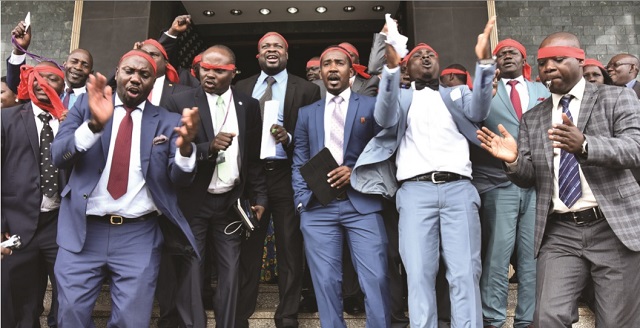
What is the country losing by focusing on it?
Kampala, Uganda | JULIUS BUSINGE | Is the ongoing debate on Article 102 (b) of the Constitution to lift the Presidential age limit the most important issue MPs and the government should be focusing on? Are there no other biting socio-economic matters that should take priority?
Supporters of lifting the age-limit so President Yoweri Museveni can stay in power say it is the most important. But opposition politicians, diplomatic entities and Civil Society and more say it is diverting the country from tackling social and economic issues.
“It [age limit debate] is a misplaced priority; it serves a purpose of political instability,” Livingstone Sewanyana, the executive director of Foundation for Human Rights Initiative (FHRI) told The Independent on Sept.22 a day after the country witnessed age limit terror unleashed by security forces in and around Parliament, on major streets in Kampala, rural towns, universities like Makerere, and at homes of key opposition politicians.
President Yoweri Museveni, who is seen as an immediate beneficiary of age limit removal, was away attending the 72nd United Nations General Assembly (UNGA) in New York.
Sewanyana said that legislators and government should now be focusing on issues like a stimulus plan for private investment, revamping the economy through agriculture policies aimed at boosting production and productivity, industrialization, and job creation.
Other urgent issues, he said, include stimulating vocational training for unskilled Ugandans, ensuring peace and security, fighting poverty, land grabbing and corruption, boosting standards in education and health sector, fighting environmental destruction and organising free and fair elections.
He said lifting age limit has no basis at the moment because it was not among the 10 electoral reform recommendations that the Supreme Court suggested to the government for action in the Amama Mbabazi 2016 Presidential Election Petition.
“Article 102(b) must be left intact; life presidency is a dangerous project,” Sewanyana said, adding, “President Museveni has had a fair share on Uganda; it is time for him to prepare the country for other leaders.”
Meanwhile, Sewanyana commented on two major issues that have arisen from the age limit debate. One is police’s siege mounted on Non- Governmental Organizations like ActionAid, and Great Lakes Institute for Strategic Studies (GLISS) on suspicion they were funding those against the age limit debate. He said it was illegal because the police did not involve the National Bureau for NGOs which monitors NGO work by law.
He said police failed to allow peaceful and organised processions of different groups including students, political parties, and others to take place, which he said violates fundamental human rights and freedoms of expression. He said the involvement of students in acts against lifting of the age limit is a manifestation that politics and governance cannot be delinked from development agenda and that students are not contented that the government is not creating opportunities for people to develop.
“What is the use of people studying and paying school fees when they can’t get jobs,” he asked.
Meanwhile, Kakungulu Mayambala, a senior lecturer at Makerere University’s School of Law told The Independent on Sept. 22 the government through cabinet should try to use good judgement when prioritizing Bills for debate in Parliament.
Mayambala, who was part of a group of Makerere University Law Dons that presented alternative views in the Amama Mbabazi Presidential Election Petition of 2016, said the age limit debate is an election related matter and could be discussed alongside the electoral reforms that were given by the Supreme Court in 2016.
He said even Speaker of Parliament Rebecca Kadaga once directed that it is best to have one comprehensive set of bills or reforms to discuss as opposed to bringing one at a time.
Mayambala said the government should not forget to deal with other issues like insecurity (referring to the murder of women in Entebbe and Nansana) and acting on government initiated investigation reports like the one of Abel Rwendeire on Makerere that was submitted but has never received attention from government.
Mayambala also said students and other groups of people have a right to protest and match without police and other security organs of the state interfering. He said universities world over are politically awakened by events of the day in their country.
 The Independent Uganda: You get the Truth we Pay the Price
The Independent Uganda: You get the Truth we Pay the Price



